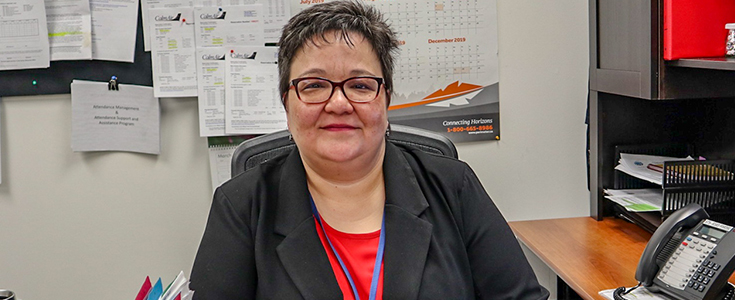Nursing on the shores of Hudson Bay
By Mike Daly
All nurses working under the auspices of the Winnipeg Regional Health Authority (WRHA) are highly trained. But only a select few can boast that a course in polar bear safety was part of their orientation.
That distinction belongs exclusively to nurses working at the Churchill Health Centre, which fell under the WRHA's jurisdiction in May, 2012. The centre serves the health care needs of the approximately 900 residents of the self-proclaimed "Polar Bear Capitol of the World," as well as patients and clients from surrounding communities in Manitoba and the Nunavut, Kitikmeot and Baffin regions.
And while many nurses might balk at the opportunity to work in a community nearly synonymous with cold weather, carnivores and isolation, the decision was an easy one for longtime nurse Cheryl McCullough, Churchill Health Centre's Manager of Patient Care.
"I was born here," McCullough says. "And one of the reasons I chose to work here was so that I could take care of my Churchill people. I have a lot of ties to this town. My grandfather, Dave Lundie, came here from The Pas as a trapper in 1929, and our family has been around ever since."
McCullough - who is proud of her Cree/Dene heritage and her status as Churchill's only Indigenous and home-grown nurse currently on staff- is part of a staff of a dedicated team of 130 people at the Churchill Health Centre, which features 21 acute care beds, a nursing unit, long term care and an emergency department. Located 1,000 kilometres north of Winnipeg on the icy shores of Hudson Bay, the town is small, but the level of care provided at its health centre is second to none.
"Quality care is important everywhere," McCullough says, "and we have to be ready for any medical situation from motor vehicle accidents to heart attacks to allergic reactions. Anything can come in through the door."
While many situations can be handled in-house, more serious cases are flown via Medevac or Life Flight to Winnipeg for treatment. That's a circumstance that can present a unique set of challenges.
"Weather is often a factor," McCullough explains." If there's a blizzard, you're not going to be able to get your patient on a plane, so you're going to have to deal with whatever it is in the emergency room. Even when the weather cooperates, a medevac plane could take a few hours to arrive, so we have be educated enough to deal with those situations. It puts some added stress on us."
Dealing with bad weather and isolation is a hallmark of life in Churchill, McCullough adds.
"Churchill is a very remote community, accessible only by air and train. There are no roads in or out of town leading to other communities, so we are used to being self-reliant. A few years ago, we had a blizzard that lasted for three days. Thankfully, there were no medical emergencies in town during that time. When it finally cleared, the town had to basically be dug out of the snow. My front door was snowed in to a depth of about nine feet."
For nurses - even those coming from Winnipeg and its infamously harsh winters - Churchill's frigid, sub-arctic temperatures can be daunting.
"It's a long, cold, dark winter, and it can take a lot of getting used to," McCullough says. "We dipped down as far as -55 Celsius this year. That was even cold for me, and I've lived here all my life. But the people we have here want to be here. They like being part of a resilient, tight-knit community and staff."
And, despite its reputation for cold, the town has surprisingly wide range of amenities.
"We have a large town centre complex that features a swimming pool, an ice rink, a bowling alley, curling rink, gymnasium, library, theatre, and our school all located in one building - so there is always a lot to do," McCullough says. "And it's not always cold. We have some short, but beautiful, summer months when beluga whales make their way into the Churchill River. You can even snorkel or kayak with them. Besides the polar bears, this is also a huge tourist draw to our little town."
Churchill is also far more cosmopolitan than many might suppose, with tourists arriving from countries throughout the globe, one of several factors that keeps McCullough at her post.
"Working in Churchill takes an adventurous person who is looking for a challenge," she admits, but she says the advantages outweigh any perceived drawbacks. Asked if she is ever tempted to leave for a life in the south, she doesn't hesitate.
"You can't leave paradise," she laughs. "Churchill is my home, and I've never wanted to leave home."
Mike Daly is a communications specialist with the Winnipeg Regional Health Authority.

